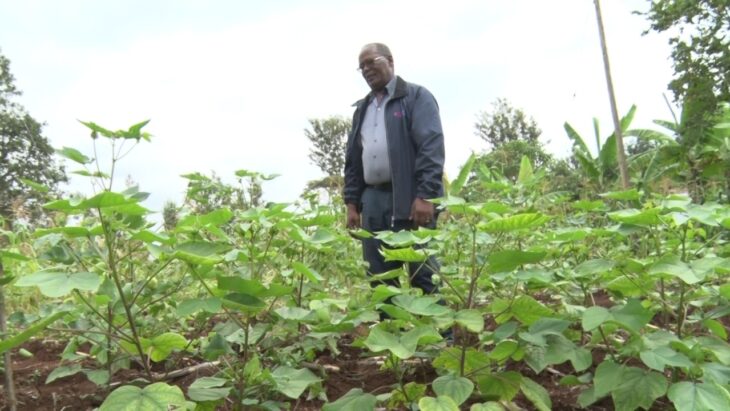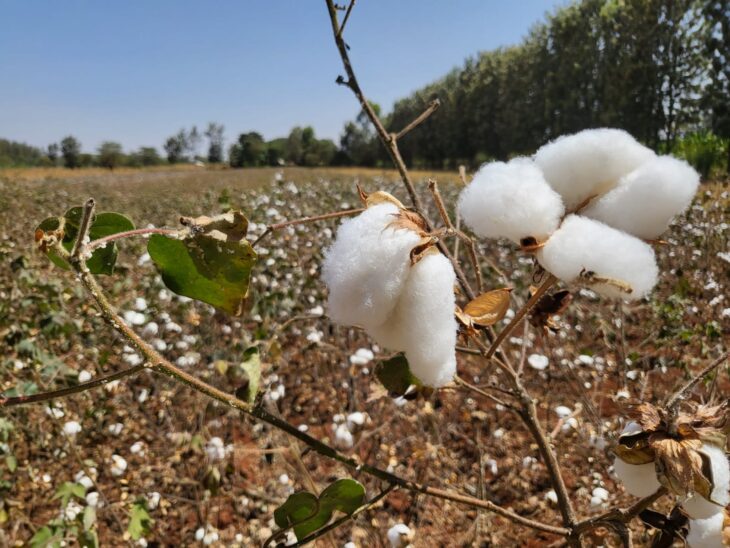KIRINYAGA, Kenya, Aug, 25 – Jesse Kariuki a cotton farmer in the slopes of Mt. Kenya in Kirinyaga county has a reason to smile after making a high profit for the first time amid switching to Biotechnology (BT) cotton which produced a double yield in his five-acre farm.
Mr.Kariuki says his farming exploits have never been the same following the introduction of Bt cotton on his farm which took less time to mature while using fewer pesticides and insecticides compared to the conventional variety which he has been growing for years.
“With the BT cotton in the last planting season, I was able to get a high yield, and save more money for other projects because the BT cotton does not require the use of more insecticides and pesticides which drained much of my resources in purchasing and spraying the conventional cotton in the same farm in the past years,” says Kariuki.
He narrates, that with the cultivation of BT cotton, he has witnessed the highest yield for the first time since he ventured into cotton farming 20 years ago.
Advantages Of BT Cotton Compared To Conventional Cotton
Speaking during a science café on BT cotton cultivation in Kenya and strengthening its value chain Kariuki says he planted 910 stems of BT cotton alongside 310 stems of an old variant of cotton in the same land and they showed a big difference.
Kariuki was supplied with the BT cotton seeds late after the rains but this did not hinder the seeds from germinating up to 100% compared to the conventional cotton which needed to be watered now and again.
He points out, that BT cotton is not attacked by birds compared to conventional variety thus minimal care is required.
“First, the BT cotton matures faster and grows healthier, producing bigger balls compared to the conventional cotton, and this is a sign of good harvest,” says Muriuki.
Mr Kariuki made a high harvest from the BT cotton compared to conventional cotton, something he is proud of.
Challenges Facing BT Cotton Growers
Unpredictable rainfall patterns due to climate change has been a major challenge facing farmers who are unable to predict the next rain season.
“Last season we received the seeds late from our suppliers, after the rains and planting season,” Kariuki narrates.
kariuki sites they are currently facing a shortage of BT cotton seeds and this forces farmers to grow other crops in their pieces of land.
The BT cotton is genetically improved to resist pests and diseases, it was introduced by the Kenyan government in 2020 to revive the cotton industry.

Supporting BT Cotton Farmers
According to the Director at International Service for the Acquisition of Agri-biotech Application-Africenter (ISAAA) Dr.Margret Karembu, they have walked a journey with BT cotton farmers by providing them with training, from preparing their farms, planting to harvesting period to ensure farmers enjoy the good yield of BT cotton.
“We have reached out to BT cotton growers from different counties across the country to ensure our farmers are well prepared and educated on the BT cotton crop,” says Dr.Karembu.
Dr.Karembu says Open Forum on Agricultural Biotechnology in Africa (OFAB) developed an online learning app where farmers link with experts to provide them with relevant materials required for good agronomy.
She noted they have encouraged farmers to enroll in online classes using this app which is essential in linking these farmers and service providers.
She admitted, that farmers had abandoned growing cotton and substituted with growing other crops such as maize and beans and they are putting efforts to revive cotton growing in the country.
Dr.Karembu encouraged farmers to venture into cotton growing because it has a long value chain in the market.
BT Cotton Marketing Opportunities
Sustainable Agricultural Information Initiative (SAII)program manager Hesborn Olweny who is also working with Thika cloth millers while making a presentation on the current BT cotton market opportunities explains that BT cotton has good marketing opportunities with the high yield witnessed by farmers.
“The introduction of the BT cotton is going to improve the textile industry with the production of its high yield due to its resistance to pests and diseases,” says Olweny.
Olweny says Kenya’s cotton production increased by 16 percent last year due to better quality seed of the BT cotton in the market.
Olweny says they are optimistic with the introduction of BT cotton in the market they are going to have more cotton from farmers and stabilize the BT cotton market.
“For now, we are importing cotton from other countries since there in low production from our farmers,” says Olweny.
He says it’s easy and cheap to import cotton however they are considering buying from Kenya in order to support local farmers.
The government has identified 23 counties nationwide which are suitable for the growing of BT cotton through geographical zoning.
Availability and Distribution Of BT Cotton
Darlington Mutetwa a Mahyco representative who distributes BT cotton in Kenya says the BT seeds recorded almost 100% germination and this will translate to a high harvest.
Mutetwa says they are conducting a yearly assessment of all cotton-growing counties to ensure the effectiveness of the technology.
“We have the capacity to supply 200MT of Mahyco BG2 cotton hybrids at 30 days if we get genuine confirmed orders,” says Mutetwa.
Mahyco says lack of confirmed orders and low volume sales limits the supply and also getting inquiries without commitment for sale are some of the challenges they are facing.
Agriculture and food Authority indicated cotton production increased from 3,015 in 2019 to 3,495 tonnes in 2020 to raise awareness of the importance of Genetically Modified (GM) cotton.
In 2019 Kenyan government distributed 24 tonnes of BT cotton seeds to the farmers which were planted on about 10,000 acres of land.
Kenya was the first country to adopt transgenic cotton in East Africa,it will also become the first country in this region to grow genome crops if approves the research of Maize and cassava which are at advanced stages.
Biotech Scientists say the BT cotton is high yielding and resistant to bollworms insects and this will revive the textile industry in the country.
Want to send us a story? Contact Shahidi News Tel: +254115512797 (Mobile & WhatsApp)


